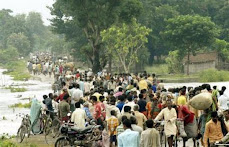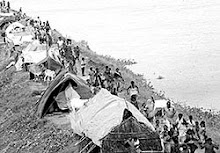Bihar State Assembly proceedings came to a grinding halt on March 16, 2010 after Opposition party MLA’s kicked up a storm over the ruling NDA government’s alleged failure to address the issue of maize crop failure in the flood-afflicted Kosi belt.
Pandemonium prevailed during the zero hour when Akhtar-ul Imam of the RJD declared the maize crop in the Kosi belt to be “a total failure” while accusing the government of “displaying gross insensitivity” by failing to address the plight of maize cultivators along the Kosi region.
Mr. Imam charged the State Government of not taking adequate measures to compensate farmers “who were being forced to take the extreme step of committing suicide following severe crop failure”.
When the State Government failed to provide a satisfactory reply, Opposition MLAs from the Rashtriya Janata Dal (RJD), the Congress and the Left parties stormed the well, brandishing stalks of maize in their hand, demanding that a thorough inquiry be conducted to assess the damage suffered by farmers.
The session resumed only after speaker Mr. Uday Narayan Chaudhary assured the Opposition that the matter would be taken seriously, while directing the Government to conduct a thorough investigation into the affair.
Agriculture Minister Ms. Renu Kuswaha later told newsmen that the Government “was trying to ascertain whether the failure had been brought on by the bad quality of seeds or by inclement weather.”
Purnia, one of the worst flood –hit districts in the Kosi belt, has over 12,000 hectares under maize cultivation. Owing to floods, farmers in the belt are increasingly opting for maize cultivation due to the high yield promised by the crop, instead of the traditional paddy and jute harvesting.
Last week, forty-year old Jagdish Sharma of Mohinipur village in Katihar district committed suicide while Mohammad Nazim of Purnia attempted to take his life, after their maize crop had failed.
The kin of both these small-margin farmers claimed that “heavy debt,” made worse by “continual crop failure” had driven them to take an extreme step.
However, when contacted, the SP of Katihar denied that the maize crop had failed in the region and said that Sharma’s death had been caused “as he had accidentally inhaled a pesticide”.
On the other hand, Purnia District Magistrate N Shravan Kumar, who has admitted to the failure of the maize crop, has indicated that poor quality seeds may have caused it.
Earlier, BJP MP from Katihar, Mr. Nikhil Chaudhary had also promised that he would urge the Bihar government to address the plight of the small-margin farmers besides raising the issue in Parliament.
The Hindu
Historically, floods and their control have never been a big issue in the Ganga-Brahmaputra basin, as it is today. Floods became a major issue after the British occupied India. When they examined the Ganga basin, they believed that if it could be made “flood-free”, they could levy a tax in return for such protection.
Saturday, 20 March 2010
Subscribe to:
Post Comments (Atom)








No comments:
Post a Comment